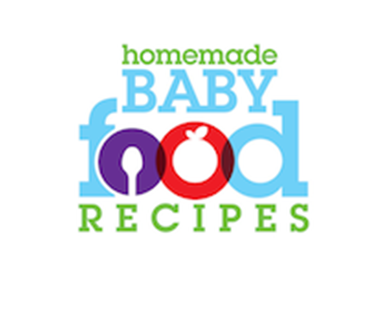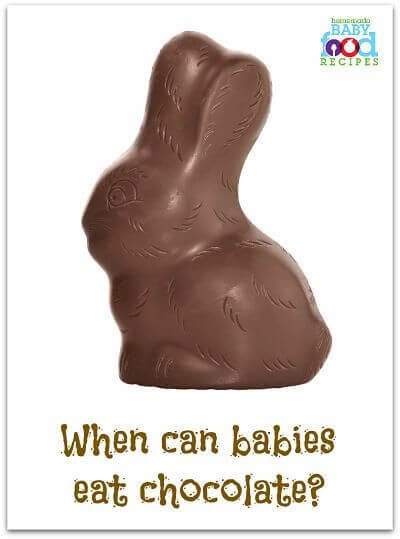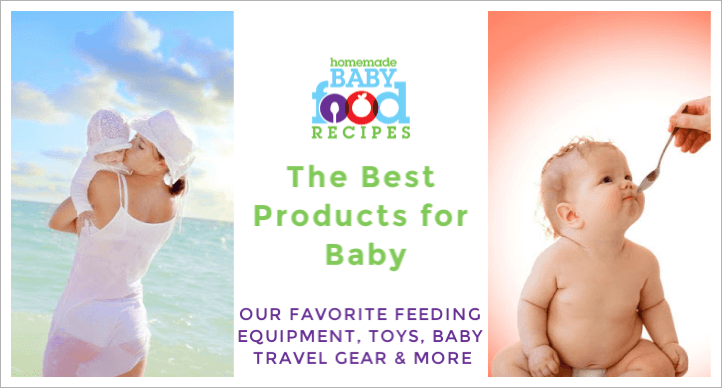When Can Babies Eat Chocolate?
We are sometimes asked if it’s OK for babies to eat chocolate, usually because parents…
- want to give baby a treat on special occasions (e.g. a piece of Easter egg)
- are looking for ways to introduce extra calories to baby
- are worried because someone has already sneaked a little chocolate to baby (grandparents are often the culprits here!)
- are looking for dessert ideas for their little one
- can’t stand the accusing stare when they’re eating their own chocolate and want to know if it’s OK to share!
Here are the answers to each of these points…
The age for giving chocolate as treats
Whilst some websites suggest waiting until baby is 1 year old to introduce chocolate, there really is no magical age of introduction.
You do, of course, need to observe the usual rules about introducing solid foods to baby – preferably after 6 months of age and offering one new food at a time, to make it easier to spot allergic reactions or digestive problems.
But other than that, there are no particular guidelines for introducing chocolate. It is not a common allergen (although you should always check the labels, as some brands contain nuts, soy etc, to which your baby may be sensitive).
So it could, in theory, be introduced to baby along with other solid foods, from 6 months of age.
BUT – chocolate is obviously NOT good for baby’s developing teeth.
And whilst it may not be considered harmful, it’s not considered useful either!
Babies have tiny tummies, so the goal at this stage is to fill them with wholesome, unprocessed foods that are as nutritious as possible.
In addition, many types of chocolate contain caffeine (see below). Caffeine is a stimulant – probably the last thing that babies need, as it is likely to throw their sleeping and feeding routines into disarray!
That being said, a little chocolate on special occasions is unlikely to cause any harm. We always allowed our babies a wee taste of their Easter eggs, which they clearly adored!
Indeed, research has shown that the moderate consumption of dark chocolate is actually GOOD for us in later life, with the benefits outweighing the risks.
Offering chocolate as a source of extra calories
If your doctor recommends that your baby needs to consume more calories, it can be quite natural to think of sweet treats like chocolate.
But there are many healthy high-calorie options that your baby can enjoy, and chocolate shouldn’t be used for this purpose.
Please see this post on our blog for some calorie-rich ideas to tempt your little one.
A sneaky treat from friends and family?
Other people may sometimes offer chocolate to your baby without your knowledge… (or consent!).
Well-meaning grandparents often undermine our efforts to promote healthy eating by offering sweet treats, usually accompanied with a whispered “Don’t tell your mom/dad”.
This can feel a little annoying, particularly when you are cast in the light of the ‘baddie’ for trying to keep baby’s diet wholesome and nutritious.
A little chocolate now and then, of course, won’t do any harm. But it’s a good idea to pack your own – healthier – ‘treats’ for friends and family to offer your baby when in their care.
Chocolate as dessert for baby
The good news here is that there are plenty of wonderful, sweet things you can prepare for your baby, without resorting to chocolate (or sugar).
Here’s a delicious sugar-free dessert recipe that your baby will love, or why not try these wonderful sweet potato and apple pancakes?
Lots more sugar-free dessert ideas
Dessert ideas from our readers
Feeling guilty about eating chocolate in front of baby?
We all know the look – your baby watches you as you unwrap your forbidden treat and his eyes follow you intently as it moves from wrapper to mouth! He knows you’ve got something good… and you’re not sharing!
But before you feel too guilty, just remember that you will often get this look from your baby WHATEVER you are eating.
In fact, I often put baby’s vegetables on to MY plate and pretend to eat them – it’s the quickest way to make him want them too!
Nevertheless, it’s a good idea to enjoy your choccies in private, particularly when you’re doing your best to promote the healthy eating message.
Which type of chocolate is best for baby?
If you decide to allow your little one to indulge, which type of chocolate should you go for?
White chocolate
This isn’t really chocolate at all! It’s made from cocoa butter, which has the aroma and taste of cocoa but actually contains NO cocoa solids. Consequently, it’s missing some of the nutrients that darker chocolate contains.
To make it sweet and creamy, the cocoa butter is mixed with milk, vanilla and LOTS of sugar.
Despite the fact that white chocolate tends to be marketed for younger children, it’s probably the worst choice!
The good: No caffeine, contains some calcium
The bad: Often contains artificial colours, very high in sugar and calories.
Milk chocolate
Unlike white chocolate, milk chocolate DOES contain cocoa, to which milk, sugar, vanilla and cocoa butter are added.
The good: Less sugar than white chocolate, contains some calcium and other nutrients
The bad: Still high in sugar, and also contains caffeine
Dark chocolate
This has the highest percentage of cocoa solids and is therefore richer in antioxidants. It is lower in sugar and does not have milk solids added, so the texture is less creamy and the flavour is far stronger – almost bitter in some cases.
The good: Highest in antioxidants, contains some iron, lowest in sugar
The bad: Highest in caffeine
Is there such a thing as healthy chocolate?
What about diabetic chocolate?
Even diabetics are warned against this, as it tends to be loaded with artificial sweeteners.
It is not, therefore, a good choice for your baby.
As with most foods, the more chocolate is processed the less healthy it becomes.
One of the least processed varieties we’ve come across to date is the Dante Confections 98% Cocoa Chocolate Bar, which contains just organic cocoa (a whopping 98%), vanilla and stevia (a natural alternative to sugar).It does, however, have a strong, bitter taste.
Carob – which many see as a healthy alternative to chocolate – is certainly better for you, but only when raw. The problem is that it’s usually combined with fats and sugars to create a more desirable taste and texture. This makes it no healthier a choice than regular chocolate.
On a positive note…
Chocolate is better for your baby (and growing child) than other types of candy and sweets because it melts off the teeth fairly quickly, rather than sticking to them.
And although it may not be one of the best sources of nutrition (to say the least!), it does contain SOME nutrients. Most candies, on the other hand, are nothing but sugar, colour and artificial flavour.
Chocolate may help stop diarrhea…
And this is something of which we have personal experience!
Our youngest daughter went through a period of chronic and alarming diarrhea as a baby that was not responsive to any treatment. But one day, a doctor suggested chocolate – so, bizarre as it sounded, we offered her some melted chocolate buttons.
Within 24 hours, the diarrhea – which had lasted for nearly 2 weeks – stopped.
This is a remedy we have used several times since, with equal success.
Tips
- Avoid describing chocolate as a ‘treat’. As your little one grows, this is likely to make it seem even more tempting!
- Set a good example by keeping your own chocolate intake minimal (or at least well hidden!)
- If you do offer chocolate to your baby, try offering a couple of cubes of cheese immediately afterwards. Cheese helps neutralise the sugar. Aim to brush baby’s teeth as soon as you can.


